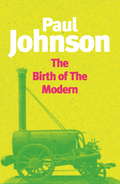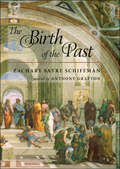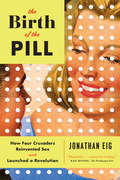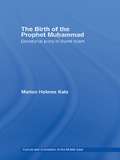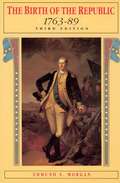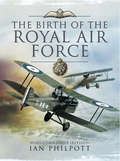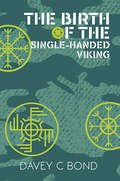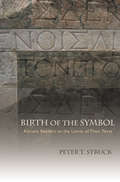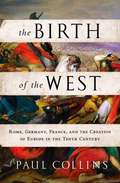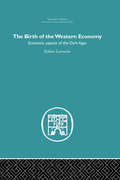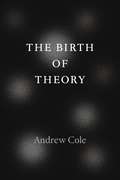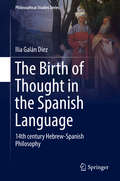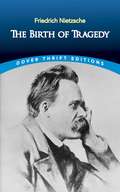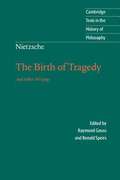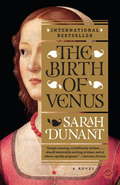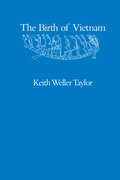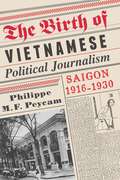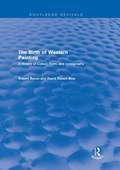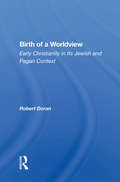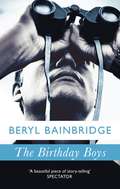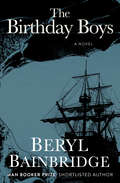- Table View
- List View
The Birth Of The Modern: World Society 1815-1830
by Paul JohnsonA classic study of fifteen crucial years in the formation of the modern worldThe Birth of the Modern has established itself as a new kind of historical work - an examination of the way the matrix of the modern world was formed. Paul Johnson, one of today's most popular historians, takes fifteen critical years and subjects them to a fascinatingly detailed analysis: their geopolitics and politics, their cultural and intellectual life, their technology and science. He investigates every area of life, in every corner of the world. And he makes of this huge variety of elements a coherent narrative, told through the lives and actual words of the age's people - outstanding and ordinary - so that the reader feels he was there.
The Birth Of The Modern: World Society 1815-1830
by Paul JohnsonA classic study of fifteen crucial years in the formation of the modern worldThe Birth of the Modern has established itself as a new kind of historical work - an examination of the way the matrix of the modern world was formed. Paul Johnson, one of today's most popular historians, takes fifteen critical years and subjects them to a fascinatingly detailed analysis: their geopolitics and politics, their cultural and intellectual life, their technology and science. He investigates every area of life, in every corner of the world. And he makes of this huge variety of elements a coherent narrative, told through the lives and actual words of the age's people - outstanding and ordinary - so that the reader feels he was there.
The Birth of the Modern World: Society 1815-1830
by Paul JohnsonPresents the case that the period just after the Napoleonic Wars was crucial to the formation of today's society.
The Birth of the Palestinian Refugee Problem Revisited
by Benny MorrisBenny Morris' The Birth of the Palestinian Refugee Problem was published in 1988. Its startling revelations about how and why 700,000 Palestinians left their homes and became refugees during the Arab-Israeli war in 1948 undermined traditional interpretations as to whether they left voluntarily or were expelled as part of a systematic plan. This 2004 book represents a revised edition of the earlier work, compiled on the basis of newly-opened Israeli military archives. While the focus remains the 1948 war and the analysis of the Palestinian exodus, the new material contains more information about what happened in Jerusalem, Jaffa and Haifa, and how events there led to the collapse of Palestinian urban society. It also sheds light on the battles and atrocities that resulted in the disintegration of rural communities. The story is a harrowing one. The refugees now number four million and their existence remains a major obstacle to peace.
The Birth of the Past
by Zachary S. SchiffmanHow we learned to distinguish past from present and see the world historically.Outstanding Academic Title, ChoiceHow did people learn to distinguish between past and present? How did they come to see the past as existing in its own distinctive context? In The Birth of the Past, Zachary Sayre Schiffman explores these questions in his sweeping survey of historical thinking in the Western world. Today we automatically distinguish between past and present, labeling things that appear out of place as "anachronisms." Schiffman shows how this tendency did not always exist and how the past as such was born of a perceived difference between past and present. Schiffman takes readers on a grand tour of historical thinking from antiquity to modernity. He shows how ancient historians could not distinguish between past and present because they conceived of multiple pasts. Christian theologians coalesced these multiple pasts into a single temporal space where past merged with present and future. Renaissance humanists began to disentangle these temporal states in their desire to resurrect classical culture, creating a "living past." French enlighteners killed off this living past when they engendered a form of social scientific thinking that measured the relations between historical entities, thus sustaining the distance between past and present and relegating each culture to its own distinctive context.Featuring a foreword by the eminent historian Anthony Grafton, this fascinating book draws upon a diverse range of sources—ancient histories, medieval theology, Renaissance art, literature, legal thought, and early modern mathematics and social science—to uncover the meaning of the past and its relationship to the present.
The Birth of the Pill: How Four Crusaders Reinvented Sex and Launched a Revolution
by Jonathan EigA Chicago Tribune 'Best Books of 2014' A Washington Post '50 Notable Works of Nonfiction & Best Science Books 2014' A Chicago Tribune 'Nonfiction Books to Gift 2014' A Slate 'Best Books 2014: Staff Picks' A Booklist '2014 Editor's Choice' & 'Top 10 Science and Health Books of 2014' A St. Louis Post-Dispatch 'Best Books of 2014: Nonfiction' The fascinating story of one of the most important scientific discoveries of the twentieth century. We know it simply as "the pill," yet its genesis was anything but simple. Jonathan Eig's masterful narrative revolves around four principal characters: the fiery feminist Margaret Sanger, who was a champion of birth control in her campaign for the rights of women but neglected her own children in pursuit of free love; the beautiful Katharine McCormick, who owed her fortune to her wealthy husband, the son of the founder of International Harvester and a schizophrenic; the visionary scientist Gregory Pincus, who was dismissed by Harvard in the 1930s as a result of his experimentation with in vitro fertilization but who, after he was approached by Sanger and McCormick, grew obsessed with the idea of inventing a drug that could stop ovulation; and the telegenic John Rock, a Catholic doctor from Boston who battled his own church to become an enormously effective advocate in the effort to win public approval for the drug that would be marketed by Searle as Enovid. Spanning the years from Sanger's heady Greenwich Village days in the early twentieth century to trial tests in Puerto Rico in the 1950s to the cusp of the sexual revolution in the 1960s, this is a grand story of radical feminist politics, scientific ingenuity, establishment opposition, and, ultimately, a sea change in social attitudes. Brilliantly researched and briskly written, The Birth of the Pill is gripping social, cultural, and scientific history.
The Birth of The Prophet Muhammad: Devotional Piety in Sunni Islam (Culture and Civilization in the Middle East)
by Marion Holmes KatzIn the medieval period, the birth of the Prophet Muhammad (the mawlid) was celebrated in popular narratives and ceremonies that expressed the religious agendas and aspirations of ordinary Muslims, including women. This book examines the Mawlid from its origins to the present day and provides a new insight into how an aspect of everyday Islamic piety has been transformed by modernity. The book gives a window into the religious lives of medieval Muslim women, rather than focusing on the limitations that were placed on them and shows how medieval popular Islam was coherent and meaningful, not just a set of deviations from scholarly norms. Concise in both historical and textual analysis, this book is an important contribution to our understanding of contemporary Muslim devotional practices and will be of great interest to postgraduate students and researchers of Islam, religious studies and medieval studies.
The Birth of the Republic: 1763 - 1789
by Edmund Sears MorganAn account of the revolutionary period spanning a quarter-century that transformed the thirteen colonies into a nation.
The Birth of the Republic, 1763-89 (The Chicago History of American Civilization) Third Edition
by Edmund S. MorganIn one remarkable quarter-century, thirteen quarrelsome colonies were transformed into a nation. Edmund S. Morgan's classic account of the Revolutionary period shows how the challenge of British taxation started the Americans on a search for constitutional principles to protect their freedom and eventually led to the Revolution. Morgan demonstrates that these principles were not abstract doctrines of political theory but grew instead out of the immediate needs and experiences of the colonists. They were held with passionate conviction, and incorporated, finally, into the constitutions of the new American states and of the United States. Though the basic theme of the book and his assessment of what the Revolution achieved remain the same, Morgan has updated the revised edition of The Birth of the Republic (1977) to include some textual and stylistic changes as well as a substantial revision of the Bibliographic Note.
The Birth of the Royal Air Force
by Ian M. PhilpottIan Philpott presents us here with a compendium of facts, operational histories and photo illustrations, combined to create a comprehensive account of the early years of the Royal Air Force. Illustrated throughout, it features details of all military operations from 1914 to 1918 which impacted upon the organisation. Also included are operational details of the Independent Bomber Force throughout 1918, a supplementary historical strand that is sure to appeal to Aviation enthusiasts with a taste for features of niche focus. Details of the airfields, landing grounds, seaplane bases and various other landmarks of this era are given, and readers are encouraged to use the work as a reference book, being as it is a weighty tome of encyclopedic scope. Sure to make a welcome addition to any aviation enthusiasts library, this well-researched piece of work has been a long time in the making. Philpott brings his typical flare to the project, leaving no stone unturned when it comes to this dynamic, defining period of Royal Air Force history.As featured in the East Kent Mercury and Essence Magazine.
The Birth of the Single-Handed Viking
by Davey C BondJamesey John Dejames, after being seriously injured by the IRA in Belfast, thinks his dream of starting 'On la Guardia' after he leaves the army had ended but his beautiful girlfriend, Janet Elaine Stark, has other ideas and soon it is up and running. It is a resounding success and attracts attention and is soon doing off the book jobs for the British and other democratic governments. New York, 2011. The stunning-looking Luca Natasha Valendenski, a Lithuanian immigrant and interior designer, is being stalked by a violent rapist and his pack of thugs when things come to a violent climax. Rabbie Hamish Dejames, son of Jamesey and head of OLG New York, arrives in the nick of time and sparks fly and shots are fired but good overcomes evil and they both soon embark on an incredible, if unorthodox, romantic journey together. Based in London, New York, Belfast and other thrilling locations and filled with colourful, dangerous and interesting characters and places, The Birth of the Single-Handed Viking will hold you gripped from start to finish and wanting more.
Birth of the Symbol: Ancient Readers at the Limits of Their Texts
by Peter T. StruckNearly all of us have studied poetry and been taught to look for the symbolic as well as literal meaning of the text. Is this the way the ancients saw poetry? In Birth of the Symbol, Peter Struck explores the ancient Greek literary critics and theorists who invented the idea of the poetic "symbol." The book notes that Aristotle and his followers did not discuss the use of poetic symbolism. Rather, a different group of Greek thinkers--the allegorists--were the first to develop the notion. Struck extensively revisits the work of the great allegorists, which has been underappreciated. He links their interest in symbolism to the importance of divination and magic in ancient times, and he demonstrates how important symbolism became when they thought about religion and philosophy. "They see the whole of great poetic language as deeply figurative," he writes, "with the potential always, even in the most mundane details, to be freighted with hidden messages." Birth of the Symbol offers a new understanding of the role of poetry in the life of ideas in ancient Greece. Moreover, it demonstrates a connection between the way we understand poetry and the way it was understood by important thinkers in ancient times.
The Birth of the West: Rome, Germany, France, and the Creation of Europe in the Tenth Century
by Paul CollinsThe tenth century dawned in violence and disorder. CharlemagneOCOs empire was in ruins, most of Spain had been claimed by Moorish invaders, and even the papacy in Rome was embroiled in petty, provincial conflicts. To many historians, it was a prime example of the ignorance and uncertainty of the Dark Ages. Yet according to historian Paul Collins, the story of the tenth century is the story of our cultureOCOs birth, of the emergence of our civilization into the light of day. "The Birth of the West" tells the story of a transformation from chaos to order, exploring the alien landscape of Europe in transition. It is a fascinatingnarrative that thoroughly renovates older conceptions of feudalism and what medieval life was actually like. The result is a wholly new vision of how civilization sprang from the unlikeliest of origins, and proof that our tenth-century ancestors are not as remote as we might think. "
The Birth of the Western Economy: Economic Aspects of the Dark Ages
by Robert LatoucheFirst Published in 2005. Routledge is an imprint of Taylor & Francis, an informa company.
The Birth of Theory
by Andrew ColeModern theory needs a history lesson. Neither Marx nor Nietzsche first gave us theoryOCoHegel did. To support this contention, Andrew ColeOCOs "The Birth of Theory" presents a refreshingly clear and lively account of the origins and legacy of HegelOCOs dialectic as theory. Cole explains how Hegel boldly broke from modern philosophy when he adopted medieval dialectical habits of thought to fashion his own dialectic. While his contemporaries rejected premodern dialectic as outdated dogma, Hegel embraced both its emphasis on language as thought and its fascination with the categories of identity and difference, creating what we now recognize as theory, distinct from systematic philosophy. Not content merely to change philosophy, Hegel also used this dialectic to expose the persistent archaism of modern life itself, Cole shows, establishing a method of social analysis that has influenced everyone from Marx and the nineteenth-century Hegelians, to Nietzsche and Bakhtin, all the way to Deleuze and Jameson. aaaaaaaaaaaBy uncovering these theoretical filiations across time, "The Birth of Theory" will not only change the way we read Hegel, but also the way we think about the histories of theory. With chapters that powerfully reanimate the overly familiar topics of ideology, commodity fetishism, and political economy, along with a groundbreaking reinterpretation of HegelOCOs famous master/slave dialectic, "The Birth of Theory" places the disciplines of philosophy, literature, and history in conversation with one another in an unprecedented way. Daring to reconcile the sworn enemies of Hegelianism and Deleuzianism, this timely book will revitalize dialectics for the twenty-first century. "
The Birth of Thought in the Spanish Language: 14th century Hebrew-Spanish Philosophy (Philosophical Studies Series #127)
by Ilia Galán DíezThis book takes readers on a philosophical discovery of a forgotten treasure, one born in the 14th century but which appears to belong to the 21st. It presents a critical, up-to-date analysis of Santob de Carrión, also known as Sem Tob, a writer and thinker whose philosophy arose in the Spain of the three great cultures: Jews, Christians, and Muslims, who then coexisted in peace. The author first presents a historical and cultural introduction that provides biographical detail as well as context for a greater understand of Santob's philosophy. Next, the book offers a dialogue with the work itself, which looks at politics, sociology, anthropology, psychology, ethics, aesthetics, metaphysics, and theodicy. The aim is not to provide an exhaustive analysis, or to comment on each and every verse, but rather to deal only with the most relevant for today’s world.Readers will discover how Santob believed knowledge must be dynamic, and tolerance fundamental, fleeing from dogma, since one cannot avoid a significant dose of moral and aesthetic relativism. Subjectivity, within its own codes, must seek a profound ethics, not puritanical but which serves to escape from general ill will. Santob offers a criticism of wealth and power that does not serve the people which appears to be totally relevant today. In spite of the fame he achieved in his own time, Santob has largely remained a vestige of the past. By the end of this book, readers will come to see why this important figure deserves to be more widely studied. Indeed, not only has this medieval Spanish philosopher searched for truth in an unstable, confused world of contradictions, but he has done so in a way that can still help us today.
The Birth of Tragedy: Out Of The Spirit Of Music (Dover Thrift Editions)
by Friedrich NietzscheAmong the most influential philosophers of modern times, Friedrich Nietzsche (1844-1900) declared in this classic study that Greek tragedy achieved greatness through a fusion of elements of Apollonian restraint and control with Dionysian components of passion and the irrational. In Nietzsche's eyes, however, Greek tragedy had been destroyed by the rationalism and optimism of thinkers like Socrates. Nevertheless, he found in these ancient works the life-affirming concept that existence is still beautiful, however grim and depressing it may sometimes be. These and many other ideas are argued with passionate conviction in this challenging book, called by British classicist F. M. Cornford "a work of profound imaginative insight, which left the scholarship of a generation toiling in the rear."
The Birth of Tragedy and Other Writings: Cambridge texts in the History of Philosophy
by Friedrich NietzscheNietzsche's discussion of the nature of culture, of the conditions under which it can flourish and of those under which it will decline, his analysis of the sources of discontent with the modern world, his criticism of rationalism and of traditional morality, his aesthetic theories and his conception of the 'Dionysiac' have had a profound influence on the philosophy, literature, music, and politics of the twentieth century.
The Birth of Venus (Random House Reader's Circle Deluxe Reading Group Edition)
by Sarah DunantThis new deluxe eBook edition features more than eighty additional pages of exclusive, author-approved annotations throughout the text, which contain new illustrations and photographs, to enrich your reading experience. You can access the eBook annotations with a simple click or tap on your eReader via the convenient links. Access them as you read the novel or as supplemental material after finishing the entire story. There is also Random House Reader's Circle bonus content, which is sure to inspire discussion at book clubs everywhere. Alessandra Cecchi is not quite fifteen when her father, a prosperous cloth merchant, brings a young painter back from northern Europe to decorate the chapel walls in the family's Florence palazzo. A child of the Renaissance with a precocious mind and a talent for drawing, Alessandra is intoxicated by the artist's abilities. But Alessandra's parents have made plans for their daughter, and she is soon married off to a wealthy, much older man. Meanwhile, the reign of the Medicis, with their love of luxury, learning, and dazzling art, is being threatened by the hellfire preaching and increasing brutality of the fundamentalist monk Savonarola and his reactionary followers. As the city shudders with violence and change, Alessandra must find her own way--and finally explore the passions she's kept so long at bay. "Simply amazing, so brilliantly written . . . almost intolerably exciting at times, and at others, equally poignant."--Antonia Fraser "A broad mural bursting with color, passion, and intrigue."--People
The Birth of Vietnam
by Keith Weller TaylorVietnamese history prior to the tenth century has often been treated as a branch of Chinese history, but the Vietnamese side of the story can no longer be ignored. In this volume Keith Taylor draws on both Chinese and Vietnamese sources to provide a balanced view of the early history of Vietnam.
The Birth of Vietnamese Political Journalism: Saigon, 1916-1930
by Philippe PeycamPhilippe M. F. Peycam completes the first ever English-language study of Vietnam's emerging political press and its resistance to colonialism. Published in the decade that preceded the Communist Party's founding, this journalistic phenomenon established a space for public, political contestation that fundamentally changed Vietnamese attitudes and the outlook of Southeast Asia. Peycam directly links Saigon's colonial urbanization to the creation of new modes of individual and collective political agency. To better justify their presence, French colonialists implemented a peculiar brand of republican imperialism to encourage the development of a highly controlled print capitalism. Yet the Vietnamese made clever use of this new form of political expression, subverting colonial discourse and putting French rulers on the defensive, while simultaneously stoking Vietnamese aspirations for autonomy. Peycam specifically considers the work of Western-educated Vietnamese journalists who, in their legal writings, called attention to the politics of French rule.Peycam rejects the notion that Communist and nationalist ideologies changed the minds of "alienated" Vietnamese during this period. Rather, he credits colonial urban modernity with shaping the Vietnamese activist-journalist and the role of the French, even at their most coercive, along with the modern public Vietnamese intellectual and his responsibility toward the group. Countering common research on anticolonial nationalism and its assumptions of ethno-cultural homogeneity, Peycam follows the merging of French republican and anarchist traditions with neo-Confucian Vietnamese behavior, giving rise to modern Vietnamese public activism, its autonomy, and its contradictory aspirations. Interweaving biography with archival newspaper and French police sources, he writes from within these journalists' changing political consciousness and their shifting perception of social roles.
The Birth of Western Painting: A History of Colour, Form and Iconography (Routledge Revivals)
by Robert Byron David Talbot RiceFirst published in 1930, this book deals with Byzantine art, not as an isolated province, but as one intimately connected with the subsequent history of European painting. After a summary of the whole question in its relation to modern art, the second chapter opens with a novel analysis of the iconoclast controversy, and shows how it was only by this movement that Hellenistic naturalism was finally vanquished and the seed of interpretational art planted in Europe in its stead. The third chapter reveals how this seed was nourished by the Constantinopolitan Renascence, and how that event, combined with the increasing humanisation of religious emotion, culminated, not only in Duccio and Giotto, but in the equally important work of their contemporaries at Mistra and Mount Athos. A detailed account of these works is given and in the last part of the book, the mystery of El Greco is finally resolved. The book is based, not only on extensive research but on personal observation of nearly all the works mentioned, in Constantinople, Greece, Crete, Italy, and Spain. It is an important and exciting addition to the history of European Art and establishes, scientifically, theories which only existed in conjecture before its publication. The book includes 94 black and white plates.
Birth Of A Worldview: Early Christianity In Its Jewish And Pagan Context
by Robert DoranThis book explores how early Christian intellectuals expressed their understanding of the cosmos. It reviews the role of women, documentation of the vitality and influence of Jewish intellectual thought, and the continuing impact of Greek intellectual thought during Christianity's formative years.
The Birthday Boys
by Beryl BainbridgeA brilliantly realized evocation of the thoughts and voices of Captain Scott and the four men with him, who suffered extraordinary hardships before finally dying during their 1912 attempt to be the first to reach the South Pole.'Bainbridge's account of the horribly familiar story is both fresh and sure-footed. The power of her imagination, her clarity of expression and mastery of language are more striking than anything else I have read this year' Jane Shilling, Sunday TelegraphThe Birthday Boys is one of Beryl Bainbridge's most acclaimed novels, telling the story of Scott's doomed expedition through the voices of five men on the voyage. As Scott, Petty Officer Taff Evans, ship's doctor Dr Edward Wilson, Lieutenant Henry Bowers and Captain Lawrence Oates step forward for their place in the narrative, the reader is gripped by the the characters themselves alongside the vividly evoked period.
The Birthday Boys: A Novel (Sound Ser.)
by Beryl BainbridgeThe dramatic, fictionalized account of Robert Falcon Scott's famed and fatal expedition to Antarctica by one of Britain's best-loved authors. Departing from Cardiff in 1910, the Terra Nova entered dark waters and headed south. On board were Petty Officer Edgar "Taff" Evans, Dr. Edward "Uncle Bill" Wilson, Capt. Robert Falcon "Con" Scott, Lt. Henry Robertson "Birdie" Bowers, and Capt. Lawrence Edward "Titus" Oates. Through an imaginative yet historically accurate retelling of the crew's mission to become the first explorers to reach the South Pole--and with each of the book's five chapters narrated from the unique perspective of one of these men--author Beryl Bainbridge imbues a tragic and thrilling adventure story with profound psychological, metaphysical, and emotional insight. The first three chapters of The Birthday Boys--recounted by Evans, Wilson, and Scott, respectively--tell of the preparations and fundraising required for the journey, two stopovers in Madeira and South Trinidad Island, and the difficult conditions the expedition faces when they land on Antarctica. It is Wilson who first fears for the safety of the crew, when from atop the ship's crow's-nest he spies a fantastical half-man-half-bird creature flying above the sea. The doctor is certain this apparition is a harbinger of death. Troubles then ensue when Scott sets up a base camp at Cape Evans as well as several depots in the direction of the South Pole. The motor sledge breaks down almost immediately, several ponies are lost to the harsh elements, and it is revealed that a competing polar expedition led by Norwegian explorer Roald Amundsen is already well ahead of Scott's team. In the final two chapters--told by Bowers and Oates--readers are taken on a dangerous but spectacular detour to a penguin rookery, where the men witness gorgeous auroras, build an igloo, gather eggs, and slaughter the arctic birds for their blubber. When a violent blizzard hits, it looks as if no one will make it out alive. But brotherly love in the face of all odds gives the men the power to survive, and the five heroes set off on their final march to the South Pole. Though history has already revealed the catastrophic end of this tale, Bainbridge shows us the bravery, courage, and humanity essential to the adventure. Masterfully blurring the boundaries between fact and fiction, The Birthday Boys is a compelling historical biography that challenges readers to discover truths that can only be reached through the imagination. This ebook features an illustrated biography of Beryl Bainbridge including rare images from the author's estate.
